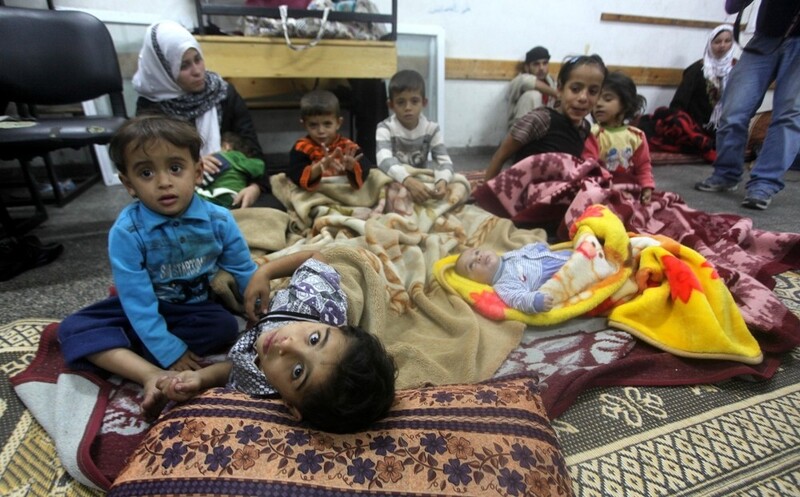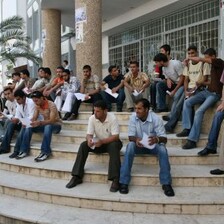The Electronic Intifada Gaza City 22 November 2012

Palestinians in a UN-run school, seeking shelter from Israeli bombing, Gaza City, 21 November
APA imagesIsrael’s attacks on the Gaza Strip displaced tens of thousands of Palestinians from their homes. Others refused to leave, even after Israeli warplanes dropped threatening leaflets on their neighborhoods on Tuesday.
Before a ceasefire took place on Wednesday night, Palestinians in Gaza scrambled to find a safer place for their families.
Walaa al-Ghussein, an English education student at Gaza City’s al-Azhar University, lives in Altwam. Her family of eight evacuated the northern village on Wednesday, 14 November, the first night of increased bombings, and came to Gaza City.
“My neighbors and relatives left with us,” she said. “They are staying somewhere near the seaport. It was the whole neighborhood, not just us.”
“They say it would be much safer here, but it’s not,” she added. “There are so many air bombardments here, and so much rumbling around us every night.”
Like many families living near the barrier dividing Israel from the Gaza Strip, the al-Ghusseins have left their homes to avoid attacks before.
“It’s not the first time for us to leave,” al-Ghussein told The Electronic Intifada. “Our neighborhood gets bombed every time. The area is full of empty land, which Israel always bombs. We left in 2009 during the war, then returned after the situation ended. We’ve been leaving since I was a little kid.”
Dangerous
This time, they expected their displacement to be shorter than it already has.
“We thought that it would only last for one day, so we didn’t bring anything from home with us,” al-Ghussein explained. “We’re staying in an office right now, and can’t go back home because it’s so dangerous.
“We can’t reach our area in the north because it’s so dangerous,” she added. “We only hear about it being bombed all the time.”
On Tuesday, a leaflet dropped over much of the Gaza Strip warned residents “to evacuate your homes immediately and move toward the center of the city” (“Israeli Military Order to Besieged Palestinians: Get out!,” The Jerusalem Fund for Education and Community Development, 20 November).
Some of al-Ghussein’s relatives thought that her family’s home, which they had left because of its proximity to Israel, would be safer for them than theirs in affected areas.
“Yesterday, when they dropped leaflets over Gaza, our relatives left,” she said. “Now they are in our house in the north, and we are here. We have nowhere else to go.”
Many Gaza City residents had already opened their homes to those fleeing from the north. By the time Israel’s evacuation orders instructed hundreds of thousands more to leave their homes, the city’s capacity to absorb guests had already been stretched thin.
Others have remained in their houses, even after the Israeli leaflets demanded they abandon them.
“We refused to leave”
Hanan Abu Nasser, a graduate business administration student at al-Azhar University and boycott, divestment, and sanctions (BDS) activist, lives in the Jabaliya refugee camp north of Gaza City.
Her family considered relocating to the city a week ago, but decided to stay. Later, the Israeli leaflets ordered the camp’s residents to evacuate, warning them, “Obeying these IDF [Israeli army] instructions will keep civilian residents like you from harm’s way.”
“My very close neighbors didn’t leave,” Abu Nasser said. “But some from our neighborhood did. And some called us, asking us to leave. But my family and I refused. We think it’s a continuation of the ethnic cleansing of Palestinians. We will not go.”
“We are already refugees,” she added. “And the whole of the Gaza Strip, with its cities, villages, and refugee camps, is a refugee camp itself after the Nakba. We have nowhere left to go.”
United in resistance
Over the past week, Abu Nasser’s family and neighborhood witnessed the full scale of Israel’s attacks.
“Yesterday, they targeted two houses close to my home,” she said. “Many of my neighbors are dead. Many others left then. Of course, many had left right from the beginning.”
A week ago, when her family considered leaving, a friend told her, “Hanan, we don’t want a repeat of the Nakba.”
“This is not the first attack on Gaza Strip,” Abu Nasser said. “This will end sooner or later. Gaza will continue, and Israel will continue attacking the Gaza Strip.
“There is a question, ‘Why Gaza?’ Because the culture of resistance is dominant in the people of Gaza. And all of us here are united in resistance.”
Despite the deaths and injuries around her, Abu Nasser saw cause for hope in reactions to Israel’s attacks.
“What’s happening in the West Bank and Jerusalem proves that this is a Palestinian matter,” she says. “It’s not only a Gazan matter.
“Many people may say that we are the losers. And we have lost a lot: many houses, many people. But what is happening in Jerusalem and the West Bank shows a very clear change in the Palestinian cause. Israel tried hard to separate the Gaza Strip from the rest of occupied Palestine. This attack shows the opposite.
“The Palestinian flag is waving in Akka [a town in present-day Israel] for the first time. This is something that hasn’t happened since 1948. But they did it this time, in solidarity with the people of Gaza. Gaza is no longer alone.”
Back in Gaza City, al-Ghussein’s family does its best to cope in difficult circumstances.
“We’re holding up, she said, quickly adding, “We’re trying to hold up. We don’t have any kids in my family. We’re all grown-ups, so we can deal with it. It’s scary, but we’re trying to stand it.”
Joe Catron is a US activist in Gaza, Palestine. He works with the Centre for Political and Development Studies (CPDS) and other Palestinian groups and international solidarity networks, particularly in support of the boycott, divestment and sanctions and prisoners’ movements. He blogs at joecatron.wordpress.com and tweets at @jncatron.




